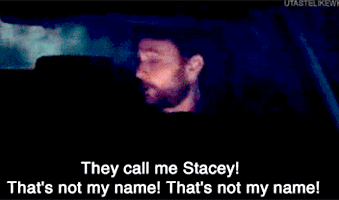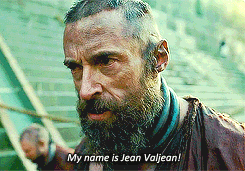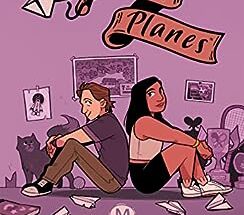 Like a lot of writers, I have a little notebook where I jot down stuff that pops into my head. Sometimes it’s an idea or phrase. Sometimes it’s nothing more than a single word. For instance, the last note I took was the word “bum.” I don’t remember what it was that inspired a character name I wrote in that notebook several years ago now but thus began the saga in naming the protagonist of my novel-in-progress.
Like a lot of writers, I have a little notebook where I jot down stuff that pops into my head. Sometimes it’s an idea or phrase. Sometimes it’s nothing more than a single word. For instance, the last note I took was the word “bum.” I don’t remember what it was that inspired a character name I wrote in that notebook several years ago now but thus began the saga in naming the protagonist of my novel-in-progress.
The name was Rude Ballet. “Like the box not the dance.” That’s what I thought the character might say about his last name. But Rude didn’t fit the character I was trying to create. Rude Ballet was a rodeo name, not the name of a boy who was abandoned by his father and who had witnessed his own mother’s drowning. I saved Rude for later and instead named the boy Calder Ballet. I spent two years building this boy, his story, his family. I loved that name. It had a nice ring to it. Calder Ballet.
The first person who had a problem with the name was the writer Elinor Lipman who graciously read a few of my chapters early on. She said Ballet was confusing. She wanted to pronounce it like the dance, not the box and thought my character’s explanation was far-fetched and distracting. And Calder, she said, reminded her of the artist Alexander Calder. That made the whole name too arty for her and not in keeping with this boy and his story. I stuck with Calder, liking the synchronicity that there actually is a mobile (a spinning sculpture, not a cell phone) in the novel. But I changed Ballet to Ballot and dropped the explanation. Darling saved, or so I thought.
When I started workshopping in the Novel Incubator, I encountered another problem, one that really bugged me. In the novel, he was often referred to as “Call,” which was an homage to Woodrow Call, a character in one of my very favorite books, Lonesome Dove, which by the way, has an incredible cast of character names. Instead, I was getting “Cal—” (like pal or gal) instead of “Call—” (like ball or, well, call). I considered changing the spelling to Callder, but that didn’t look at all right to me. I tried not to care even though that gape-mouthed “a” set my teeth on edge.
Choosing character names should be easy, like naming a baby. Pick a name that means “loyal” in Norwegian or “gorgeous” in Croatian or “villain” in Portuguese and you’re all set. Turns out, it’s pretty hard to name a baby, especially one you’ve been living with for a number of years, who has been set upon by hard times, or loved, or abandoned, or tricked, a person who hollers back at you from the page, “That’s not my name!”
Based on my own experience with my cast of characters, I came up with this handful of tips.
- Capture the essence of your character. For instance, I have a character in my book named Aveline. She has a couple of bird connections so I chose that name for its bird-like feeling. It’s another one of those names that might get mispronounced when a reader says it out loud (I say A-vah-line but I’ve heard people say Av-ah-leen). I don’t much care either way. I like the way it looks on the page. I think it’s a name her mother would have picked for her. It suits her. Be careful not to go too far. I didn’t call her Birdy. If you’re trying to find a name that fits a character trait, try to avoid clichés like the name Sage for the wise man or Lucifer for the bad guy. Likewise, if your character name is nondescript, it gives you that much more to do to flesh him out.
- Consider pronunciation when naming characters. Or at least be willing to accept that your readers may silently botch the pronunciation. Hermione worked out okay for J.K. Rowling, but how many American readers thought it was “Her-me-one” before the movie came out? And don’t think just because you’re using a simple word (“Call”) that you’re automatically going to get the pronunciation you intend. The opposite is true as well. Don’t expect an exotic pronunciation out of a simple spelling. As I was reading Stef Penney’s, The Tenderness of Wolves, in my head I pronounced a character’s name exactly as it was spelled. During my book group, I started talking about the character whose name was Line. I was practically laughed out of the room. “It’s pronounced Lee-na,” they said. How did they know? It’s become a standing joke though I think I was perfectly justified in my direct pronunciation.
- Give your characters names with sounds that roll and bite. Matt Salesses did a great session at the 2013 Muse and the Marketplace on the essentials of style. His style guide is included here along with some fantastic tips on revision. At the Muse, he talked at length about the cadence of sentences, of sounds that interact with each other. Consider character names that way, too. Harry Potter. Atticus Finch. Holly Golightly. Augustus McCrae. Sula Peace. Katniss Everdeen. Bigger Thomas. Dolores Haze. Some of my favorite character names are Reuben Land from Peace Like A River, Jody Baxter in The Yearling, and Bucky Wunderlick from Great Jones Street (but not everyone is Don DeLillo so consider whether that kind of über name is really workable for your novel).
- Speaking of go lightly, don’t bog down your novel with too many crazy or unusual character names. Sometimes you need a Joe. Sometimes the reader needs a Joe. Alexi Zentner, my second reader in the Novel Incubator, created the character Cordelia Kings for his novel The Lobster Kings. (It’s worth noting that while his novel parallels King Lear, he moderated himself by using only one of Lear’s daughters’ names, not all three.) He told me that some of my character names drove him nuts. They were just too unusual. His advice led me to make considerable changes that I’ll get into later.
- Create a cast of characters. Think about who the mother is and whether she’d give a certain name to her son. Think about the best friends and how readers will consider them as a pair. What characters are in scenes together? Do their names vary in length? Do they start with different letters? I have a terrible time differentiating certain names. Steve and Dave. Craig and Greg and Gary. Maybe it’s the v’s and g’s. Watch for unintended repetition and rhyme but consider names that sound good together if the characters end up that way.
So what ever happened to Calder Ballot anyway? Off the page, we grow old. But on the page, our characters remain in their stories. For me, Calder was always a boy. In my earliest drafts, he never appeared on the page out of his teens. When I switched from the first person narrator to a reminiscent first person, the voice of the narrator shifted to an adult. That was okay for a while, but that boy’s name nagged at me sometimes. When I encountered those problems I noted earlier, I secretly questioned the appropriateness of my protagonist’s name for the narrative voice. It was a darling I didn’t want to kill off. Then, Alexi said Calder’s nickname wasn’t scanning right on the page. Was it Call or Cal? Call bugged him because it felt too close to a bird call, which plays prominently in the novel. Cal had that nagging flat assonance with the last name Ballot. And that was too much straw on my back. I changed his name.
I made a list, imagined my character introducing himself with each prospective name, looked at the name, right down to the letters, on the page. Was it a name that his mother, Valerie Furniss, would have given him? Would his father, Jay Ballot, have approved? Did it sound like a boy from a small town, who worked on a farm, who was gentle yet damaged? Did it sound like the man that boy would become? What sold me was imagining the girl saying it, the way she would put her lips together to form that “w”, how that single-syllable name would seep out like steam, like a wish on breath blowing out a candle. Yes, I could imagine Kellie Fisher professing her love to Wes Ballot.
So, it’s Wes. And I’m good with that. I still love Calder Ballot. Even some of my early readers had a hard time when they learned his name had been changed. But I think it was the right thing to do. And yes, I violated another naming rule—don’t have character names end in an “s” because the possessive gets so unruly. But, then again, I named my own son Miles. I think it suits him.





3 comments